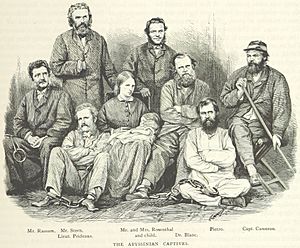Charles Duncan Cameron facts for kids
Charles Duncan Cameron (born in 1825, died in 1870) was a British soldier. He worked as a British consul in Ethiopia. A consul is like an official representative for a country in another country. Cameron was put in prison by Emperor Tewodros II. This event was one of the main reasons for the 1868 Expedition to Abyssinia, which was a military mission to rescue the captives.
Contents
Who Was Charles Cameron?
Early Life and Military Career
Charles Cameron was born on the Isle of Man in 1825. His father was Colonel Allan Cameron. Charles joined the army in 1846 as a young officer. He served with the 45th Foot regiment until 1851. During this time, he helped local forces in the Kaffir War of 1846–1847.
After leaving the 45th regiment, Cameron settled in Natal, a British colony in South Africa. He worked for the government there, dealing with diplomatic matters in the Zulu areas. He also served as a magistrate, which is like a judge, in the Klip River district. He led local troops from Natal to the Cape Colony during another war in 1851–1852.
When the Crimean War started, Cameron joined the staff of Sir Fenwick Williams, a British official working with the Turkish army. He was put in charge of building defenses in Erzeroum. After the city of Kars fell, he was sent on a special mission to Trebizond until 1856. For his military service, he received several medals.
Becoming a Consul
After his military career, Cameron joined the civil service. This meant he worked for the government in a non-military role. In 1858, he became a vice-consul in Redout Kale, and then in Poti in 1859.
In 1860, Charles Cameron was chosen to be the British consul in Abyssinia (now Ethiopia). His job was to live in Massawa and represent Britain there. He arrived in Massawa in January 1862. That same year, he traveled with the Grand Duke of Saxe-Cobourg, a European royal, during a visit to the country.
Later, Cameron left Massawa to deliver a special letter and gifts from Queen Victoria to Emperor Tewodros. He reached the Emperor's camp in October 1862. Cameron sent a report back to the British Foreign Office, including a letter from Emperor Tewodros. However, the Emperor's letter was not read by the British officials.
Imprisonment and Rescue
While waiting for a reply, Consul Cameron visited areas like the Bogos, Kassala, and Metemma. He was trying to strengthen British influence in these regions. He returned to Ethiopia in June 1863 and stayed with missionaries in Jenda.
Emperor Tewodros became suspicious of Cameron's travels. More importantly, he was upset because he had not received a reply to his letter to Queen Victoria. Cameron reportedly told the Emperor that he would risk his own life if a reply didn't come within two months.
The Emperor's frustration grew. He took it out on one of the missionaries, Henry Aaron Stern, who had written something about the Emperor's past that Tewodros didn't like. Stern and his colleague were put in chains and treated very harshly. Consul Cameron spent months trying to get them released, but he was not successful.
Finally, a reply to Cameron's report arrived in November 1863. But it didn't mention the Emperor's letter at all! Instead, it told Cameron off for traveling beyond Massawa and ordered him to return to the port. Cameron still tried to calm Tewodros and asked for permission to leave. However, the Emperor was very suspicious. On January 3, 1864, he ordered Consul Cameron, his European staff, and the four missionaries to be put in chains. Cameron was then forced to send a short message to London: "No release until civil answer to King's letter arrives."
Cameron remained a prisoner until Hormuzd Rassam arrived at the Emperor's camp in January 1865. Rassam had been sent with the long-awaited reply to the Emperor's letter. He had to wait almost a year in Massawa before he could travel inland.
Even after a kind of trial where they were supposedly released, Cameron, the missionaries, and Rassam were arrested again. They were held at Maqdala from July 12, 1866. They were finally freed on April 11, 1868, when the British army arrived at Maqdala.
Cameron returned to England in July 1868 and retired from his job later that year. He passed away in Geneva on May 30, 1870. In 1858, he had been elected a fellow of the Royal Geographical Society, an important group for explorers and geographers.
Images for kids
 | Jewel Prestage |
 | Ella Baker |
 | Fannie Lou Hamer |



